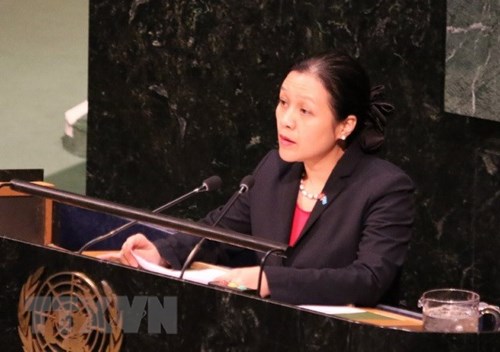“Traversing time and space, crossing national borders, the values of Buddhism have strengthened the bonds among nations, building a firm foundation for a more peaceful and compassionate world,” the ambassador said in her speech.
She stressed that in today's world where conflicts, inequality and poverty still persist, Lord Buddha’s teachings guide us on the pathway to overcome challenges through kindness and mutual understanding. People are inspired by his teachings to keep up the aspiration and strong determination to achieve equality, sustainable peace and development for all.
    |
 |
|
Ambassador Nguyen Phuong Nga, Head of Vietnam’s Permanent Mission to the United Nations |
Talking about the religion’s role in Vietnam, Nga said for more than 2000 years since Buddhism was introduced to Vietnam, Buddhism has always represented a strong force for peace and harmony in the country’s society, making great contributions to the course of national defense, construction and development.
The ambassador took the occasion to reiterate that Vietnam pursues the consistent policy of respecting and creating favorable conditions for the people to exercise their right to freedom of belief and religion, promoting mutual respect, unity and harmony among religions as well as cultural and moral values of each and every religion.
“All religions, however diverse, converge in the common aspiration for the development of the whole nation and the betterment of peoples' lives,” she said.
In his remark, President of the UN General Assembly Miroslav Lajcak underscored the importance of “timeless principles” of Buddhism to the work of the UN, saying that they offer insights and ideals on improving the planet and show people the way to a more sustainable future.
UN Secretary General Antonio Guterres also highlighted Buddhism’s emphasis on non-violence as a powerful call for peace and said the Buddhist world view teaches people to see themselves as a part of this world and not as its matters.
The focus in Buddhism on the inherent dignity of life finds resonance today in the 2030 Agenda for Sustainable Development, he said, urging everyone commit to overcome differences, care for the most venerable and truly leave no one behind.
In 1999, the UN General Assembly adopted a resolution in which it recognized the Day of Vesak, the Day of the Full Moon, to acknowledge the contributions that Buddhism, one of the oldest religions in the world, has made for over two and a half millennia and continues to make to the spirituality of humanity.
Source: VNA